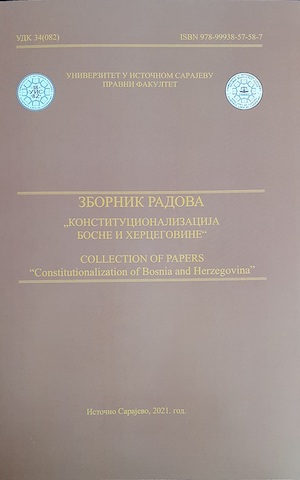Конституционализација начела подјеле власти у Уставу Босне и Херцеговине
Constitutionalization of the Principle of Separation of Powers in the Constitution of Bosnia and Herzegovina
Author(s): Goran Marković
Subject(s): Law, Constitution, Jurisprudence, Constitutional Law
Published by: Правни факултет Универзитета у Источном Сарајеву
Keywords: The principles of separation of powers; Semi-presidential system; Parliamentary system; Bosnia and Herzegovina; Parliamentary Assembly; Presidency; Council of Ministries; The right of veto;
Summary/Abstract: The analysis of the content of the constitutionalization of the principle of separation of powers in the Constitution of Bosnia and Herzegovina is important not only for giving a theoretical answer to the question of the system of state power which is prescribed by this constitution, but also for understanding the essence of relations between the political institutions of Bosnia and Herzegovina. The goal of this research is multiple. First, the constitutional framework for mutual relations of political institutions has to be analyzed, in order to answer the question whether their normative relationship is based on the balance and equality, or on the hierarchy.Secondly, the analysis of constitutional and other legal norms should point out their good and bad sides, i.e. point out the omissions made by the constitution-maker and the legislator. Apart of the analysis aims to make proposals for changes in the constitutional and legal norms. Third, the analysis can not be only the constitutional but also the political one. The analysis starts from the understanding that the principle of separation of powers often turns into its opposite, which, as a rule, is reflected in the de
facto supremacy of the executive. Political analysis should provide an answer to the question whether this is the case in the relation to the political institutions of Bosnia and Herzegovina, which of them is dominant, and how the dominance is reflected. To answer these questions, we have to analyze the functioning of these institutions in those segments that are important for their relationship. The author concludes that the Constitution of Bosnia and Herzegovina constitutionalizes the semi-presidential system of government. The head of state has significant competences,especially in the field of foreign policy, but there are also means of influencing the legislature.Certain features of the semi-presidential system are missing, such as the right of veto and powers in extraordinary circumstances, but these facts cannot call into the question the previous conclusion, because other features of this system are present.
Book: Зборник радова"Кoнституционализација Босне и Херцеговине"
- Page Range: 35-72
- Page Count: 38
- Publication Year: 2021
- Language: Serbian
- Content File-PDF

